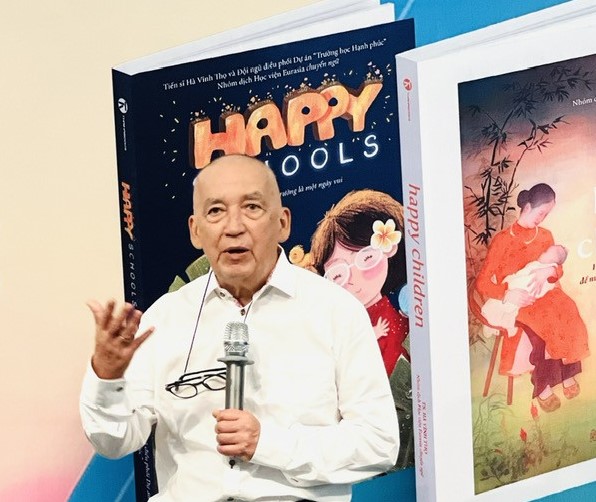.jfif) Opinion
Opinion

 |
| Dr. Hà Vĩnh Thọ speaking at a seminar on happiness in Hà Nội on April 1. |
Happiness is a skill that can — and should — be learned, according to Dr. Hà Vĩnh Thọ, founder of the Eurasia Learning Institute for Happiness and Wellbeing.
The son of a Vietnamese father and a French mother, Dr. Thọ spent most of his formative years in Europe. He first visited Việt Nam with his father in 1982 at the age of 31 and immediately felt a connection to the country.
The chairman of the Eurasia Foundation served as the programme director of Bhutan's Gross National Happiness Center from 2012 to 2018. He is a well-known international speaker on Gross National Happiness (GNH), looking beyond GDP for happiness and well-being in education, business and communities and the mastermind behind the Happy Schools project in Việt Nam.
He spoke to Việt Nam News reporter Nguyễn Khánh Chi on the sidelines of a seminar on happiness held this month in Hà Nội.
Everyone has a different definition of happiness. How do you define it and what is the essence of happiness?
Genuine happiness transcends short-lived pleasures and mere superficial satisfaction based on consumption. True happiness comes from balancing external conditions with cultivating inner competencies that foster happiness and well-being. The structural conditions can be summarised by the four domains of GNH.
First of all, I want to mention sustainable and equitable socio-economic development. This pillar emphasises the importance of ensuring that economic growth is sustainable and benefits all sections of society.
Second, it is the conservation of the environment. Recognising the intrinsic value of the natural environment, this pillar focuses on the protection and preservation of natural resources.
The third domain is the preservation and promotion of culture. This pillar aims to maintain and promote the rich cultural heritage of the country.
Finally, it is good governance. The governance pillar stresses the importance of an administration that is responsive, transparent, accountable, and ethical.
The inner dimensions can be summarised in three harmonies: living in harmony and caring for oneself, living in harmony and caring for others and society, and living in harmony and caring for nature and the planet.
As you often say, ‘Happiness is a skill and each individual needs to master it’. Could you elaborate on that?
To achieve the three harmonies described above, it is necessary to develop core competencies:
Mindfulness is the practice of intentionally focusing one's attention on the present moment without judgment. Scientific research supports its benefits for mental health, including reducing stress, anxiety and depression. Harvard Medical School has created an institute for Mindfulness in Public Health dedicated to studying the impact of mindfulness on health.
Emotional Intelligence is the ability to recognise, understand, and manage our own emotions, empathise with others, and make responsible and ethical decisions. It is grounded in neuroscience and psychology, showing its significance for personal success, leadership effectiveness, and mental well-being.
These two elements are skills and like all skills, they can be learned and trained.
The Happy Schools project started in Thừa Thiên Huế Province in 2018. How has it been expanded into other localities in Việt Nam?
The Happy Schools project focuses on fostering self-care, empathy, and environmental awareness among students. It includes training teachers in mindfulness and socio-emotional learning. It has also been implemented in seven schools in Hà Nội, and we are currently developing an online version to scale it up.
Huế College of Education has conducted a third-party assessment of the impact of Happy Schools in Huế, and the results clearly show the beneficial impact on students, teachers, and even families.
In 2023, we conducted an International Symposium at Huế University that attracted up to 500 participants from Việt Nam and from many other countries, including the former Minister of Education of Bhutan, the Deputy Minister of Education and Training Nguyễn Văn Phúc, and the Director of the OECD PISA survey, Prof. Andreas Schleicher.
Academic achievements can be measured through grades. With happiness, is there any way to measure or evaluate the success of a happy school?
Yes, happiness and well-being in educational settings, akin to "happy schools", can be measured using tools such as the new PISA Happy Life Dashboard. This innovative approach offers an example of how international benchmarks are evolving to assess students' happiness and well-being, alongside traditional academic achievements. The Dashboard integrates various indicators related to emotional and social learning, mental health and overall life satisfaction, providing a comprehensive measure of the success of schools in fostering a nurturing and happy environment for students.
 |
| Dr. Hà Vĩnh Thọ with pupils from the Việt Nam - Cuba Secondary School at a workshop on happiness held in Hà Nội on April 1. VNS Photo Khánh Chi |
Aside from the Happy Schools project, you are also working with businesses. How are you supporting companies implementing Gross National Happiness in their business?
The three fundamental elements of GNH for businesses involve redefining Vision, Mission, and Values considering the GNH framework; developing Happiness Skills among leaders, managers, and employees; and Measuring What Matters by using the GNH index.
Businesses aligning with GNH principles incorporate values that promote inclusive growth, ethical behaviour, and the well-being of employees, stakeholders, and society.
Central to GNH is the cultivation of Happiness Skills such as resilience, positivity, empathic communication, and emotional intelligence, enhancing the overall health of the work culture.
Furthermore, the adoption of a comprehensive measurement framework, guided by the nine domains of the GNH Index, enables businesses to evaluate their impact on various well-being indicators, fostering balanced and sustainable operations.
BITIS and Mainetti are the first two companies in Việt Nam that have successfully implemented GNH in their business model.
With the release of three books Happy Organisations, Happy Children and Happy Schools in Vietnamese, are you really happy with your efforts to scale up happiness for Vietnamese children, schools and communities?
Since I began promoting Gross National Happiness in Việt Nam, I have been positively surprised by the openness of the Vietnamese public to these ideas, and by the willingness of educators and businesspeople to courageously implement them in their context.
I think that deep down, these values resonate with Vietnamese culture, and that the time is ripe to focus on the happiness and well-being of all people, after decades that were necessarily focused on economic growth and rebuilding the country after decades of war.
Furthermore, the slogan of the Socialist Republic of Việt Nam is "Independence - Freedom - Happiness" (Độc lập - Tự do - Hạnh phúc). Past generations have made tremendous and heroic sacrifices to ensure Independence and Freedom; it might be the mission of current generations to focus on happiness.
Will you plan to release more books on happiness for Vietnamese readers?
Two books have already been written and will be released by Thai Ha Books in the coming months.
Happy Families is a practical guide for young parents on nurturing happy, well-adjusted children. Combining scientific insights with personal experiences, it covers child development, emotional security, and mindful parenting, while addressing modern challenges. The book aims to support parents in building strong, resilient families by providing actionable advice and fostering a supportive home environment.
Pathways to Happiness: The Many Faces of Love explores the complexity and diversity of love, drawing from personal experiences, literature, philosophy, and psychology to illustrate its transformative power on individual happiness and societal well-being. Through engaging narratives and reflective prompts, the book offers a profound journey into understanding love's various forms and its crucial role in human development and fulfillment.
Furthermore, I am currently writing a new book. Happy Village explores the integration of Confucianism, Taoism, Buddhism, and the Gross National Happiness framework within Vietnamese culture, presenting a vision for sustainable village development that harmonises traditional values and modern innovations. The book offers a comprehensive look at the evolution of Vietnamese village life and its significance in shaping a balanced, harmonious future. VNS




